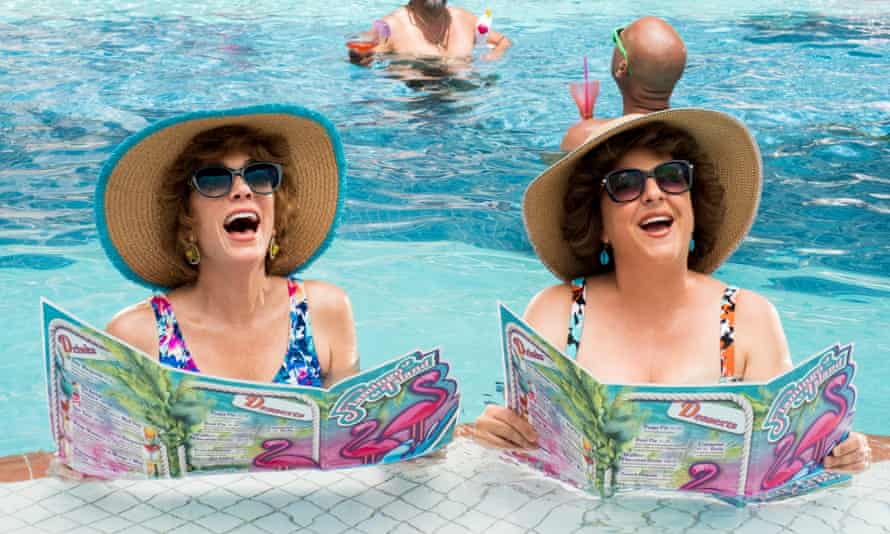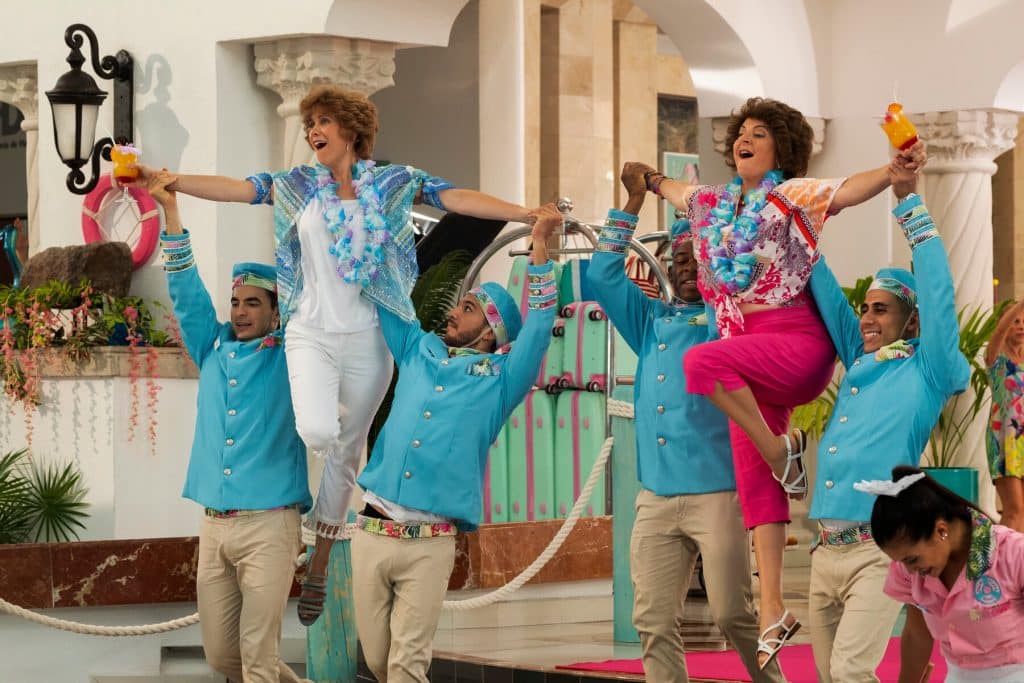In challenging times, a movie with a talking crab can be a balm for the soul.
If you’ve ever heard the phrase “May you live in interesting times,” understand this: we’re living in them right now. It’s a historically awful time of racial unrest, an ever-widening gap between the rich and the poor, and a global pandemic that’s coldly highlighted how little many of us care about our fellow humans. Optimism is in very limited supply at the moment, and so we cling to the little things that give us joy, and a reason to keep going the next day. Things like Lil Nas X’s Twitter feed, or Ted Lasso, or Lady Gaga branded Oreo cookies. Things like Barb and Star Go to Vista del Mar, which in better times might have made barely a blip on the pop culture radar, but right now feels like a cool drink of water on a very hot day, and is a cult hit in the making.
It’s difficult to describe what kind of movie Barb and Star is. It’s been compared to Airplane!, but that’s not quite right. It’s been described as a musical comedy, but with only a small handful of songs, it’s not exactly that either (although to be fair the showstopper “Edgar’s Prayer” should count as three or four numbers). It’s weird, and deeply silly, but mostly it’s…nice.
In these cynical, irony poisoned times, nice is often viewed with suspicion, if not outright hostility. If you’re nice, you’re either a phony, or not very bright. It doesn’t help that people like Ellen DeGeneres, long billed as the “Queen of Nice,” often reveal themselves to be anything but. It’s perceived as a meaningless compliment we apply to people when we can’t think of anything else more valuable to say about them. In some cases, however, “nice” can mean pleasant, soothing, undemanding of any real emotional effort. Barb and Star is nice, a comedy that lacks the dispiriting punching down humor of so many other films in the same genre.

If not for the fact that most of us spent the past nearly year and a half locked in our homes, Barb and Star might have struggled to find an audience. Written by and starring Kristen Wiig and Annie Mumolo, it wasn’t exactly eagerly anticipated. Their last collaboration, Bridesmaids, was, of course, a smash, but that came out ten years ago, which in Hollywood time might as well be the 1970s. Wiig and Mumolo stubbornly refused to churn out three sequels to it, sticking mostly with acting and voiceover work. Wiig in recent years seemed to be having difficulty finding the right role to suit her quirky energy, appearing in artsy flops like Downsizing and Where’d You Go, Bernadette, and playing one of the two antagonists in Wonder Woman 1984.
It didn’t help that its trailer landed with a bit of a thud, misrepresenting (as so many trailers inexplicably do) what exactly it was about, and who it was for. It initially seemed like it was playing right into the stereotype of the frumpy, unfuckable middle-aged woman, the titular characters dressing like no middle-aged woman in the 21st century would actually dress, and wearing wigs that looked to be from the same company that designed the Brillo pad Glenn Close wears on her head in Hillbilly Elegy. The trailer is cut in a way that suggests all the other characters are perplexed and annoyed by Barb and Star’s aggressive (and perhaps dumb and naive) good cheer. In other words, it’s made to look as if the entertainment in Barb and Star comes from seeing these characters making asses out of themselves and being set up for humiliation.
So, it’s a delightful surprise when exactly none of that happens.
Barb (Mumolo) and Star (Wiig) are best friends, and roommates after widowhood and divorce leave them single. Their relationship is less like a friendship and more like an old married couple, where they finish each other’s sentences and can’t imagine being apart from one another. Though they’re mostly content with their quiet Midwestern life, where they somehow manage to support themselves by working at a furniture store without actually selling anything, something is lacking. The furniture store closing down proves to be an unexpected blessing, as it pushes them to step out of their comfort zone and take a vacation to glamorous Vista del Mar, Florida, where they hope to find their “shimmer.”
Barb and Star is nice, a comedy that lacks the dispiriting punching down humor of so many other films in the same genre.
Barb and Star aren’t even at their resort for a full day before they meet the mysterious, handsome Edgar (Jamie Dornan), with whom they have a drunken three-way. Though they’re initially willing to move on and forget about it afterward, Star finds herself falling for Edgar, and he for her in kind. Complicating matters is that Edgar is at Vista del Mar to set up a bomb for the evil Sharon Gordon Fisherman (also Wiig, doing a marvelous Tilda Swinton impersonation), who manipulates Edgar by promising him that they’ll be an “official couple” when he returns. At minimum, Barb and Star’s friendship is threatened, but also hundreds of other middle-aged beachgoers’ lives may hang in the balance.
I haven’t really touched upon the weirder aspects of Barb and Star, such as it opening with a chubby little boy riding his bike and singing along to Barbra Streisand’s “Guilty,” or the talking crab who gives Star advice before returning to the sea with a somber “Farewell, me.” There’s also hot dog soup, and Edgar’s ballet twirl, and Richard Cheese’s song about boobies, and Trish, whom Barb and Star just seem to create out of thin air. There’s Barb and Star’s surreal conversations about caramel square addiction and sex dreams involving the Pringles man. A simple, potentially contrived plot is bolstered by bizarre humor, and the genuine, believable chemistry between Barb and Star. More than anything else, though, it’s nice. It’s good-natured. It makes you laugh without grimacing.
One of the running gags in Barb and Star is that Star believes herself to be hideously unattractive. This is ostensibly because her ex-husband, the oft-referred to but never seen Carmine, left her for another woman. However, it also feels like a clever dig at the extremely tiresome perception, both in pop culture and in real life, that women instantly become sexless hags once they reach their fortieth (or even thirtieth) birthdays. The “punchline” to this gag is that lots of people think Star is attractive. Men check her out at the resort, the younger, undeniably attractive Edgar is besotted with her, even Sharon Gordon Fisherman admits she’s beautiful. All that, and there isn’t even the expected makeover scene. Edgar isn’t just physically attracted to Star, he’s moved by her kind heart and ability to return love, neither of which he can find in Sharon.

Compare this to 2018’s I Feel Pretty, in which Amy Schumer plays a character who, only after suffering a massive head injury, is “deluded” into thinking she’s attractive. The gag here is the other characters’ befuddlement that this slightly plump, slightly plain but not at all ugly woman should suddenly have so much confidence in herself. I Feel Pretty talks out of both sides of its mouth with a body positive message (and also pointing out that the beautiful people don’t have it easy either), while still making Schumer the target of countless plus-size jokes. In Barb and Star, the audience isn’t supposed to think it’s funny (or unlikely, or just flat out gross) that Edgar falls for Star. Why wouldn’t he? She’s a good person.
The film very briefly teases the idea that Barb and Star might end up competing with each other for Edgar’s attention, then drops it. Barb is initially interested in Edgar, but ultimately chooses not to pursue him because it would mean lying to Star, and jeopardizing their friendship. Despite the fact that a lot of movies about female friendship are powered by the curious belief that women secretly hate each other, there’s no fighting over Edgar, no undercurrent of hostility, no suggestion that anyone will be forced to “choose” one person over another. This is something that bears itself out in real life, contradictory to what Hollywood may tell you: most women don’t end up pissing away a close, longtime friendship over a man, particularly one they’ve just met.
Even villain Sharon Gordon Fisherman’s comeuppance ends up zagging on the audience. We learn that her motivation for the bombing is revenge for being humiliated years earlier at the town’s Seafood Jam Festival. Though it looks like she’s going to meet with the same humiliation again, instead Barb and Star reach out to Sharon in friendship, and all is forgiven, even her earlier forcing them to jump off a cliff to avoid being eaten by alligators. Is it a corny ending? Yes. Is it a nice ending? Also yes.

Now, to be fair, a lot of comedies less pleasant than Barb and Star still end on a “nice” note. Meet the Parents, in which Ben Stiller is harassed, belittled and spied on by his fiancee’s psychotic father for no reason other than he has the audacity to exist, ends with the father grudgingly welcoming him into the family. It’s almost enough to make you overlook the baffling thread of mean-spiritedness that runs through the entire movie.
Then, in two subsequent films, we’re back at square one, with the father-in-law continuing his inexplicable campaign of humiliation, often accompanied by other members of the family. How funny you’ll find any of this depends on whether you believe that Stiller’s character deserves that kind of treatment, though the films rarely go out of their way to make it seem like he does, other than perhaps because he lacks a spine and mostly just takes the abuse that’s heaped upon him. Each film again ending with Stiller’s in-laws deciding that he’s an okay guy after all is supposed to suggest that it was all worth it.
Though no one would ever claim it’s a deep or insightful movie, Barb and Star also doesn’t try to play both sides of the fence. It’s a light, silly comedy from beginning to end, without a single mean bone in its body. It doesn’t cap off ninety minutes of people being unrelenting assholes to each other with an unearned uplifting conclusion. As we struggle to find our way to a new normal while surviving in one of the darkest timelines, maybe we could do with a little more sweetness in our pop culture, to take the edge off the bitterness. It doesn’t have to be forced, or phony, just a little respite. Real life is hard enough as it is.